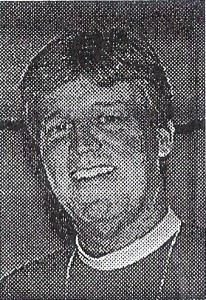Episcopal Bishop Craig Anderson, newly installed president of the National Council of Churches of Christ (NVV), believes new opportunities exist for the council to be a clear and bold Christian witness on the brink of the new millennium.
Anderson was installed at the National Cathedral on Nov. 12 during the NCC’s annual general assembly.
The NCC, which has 34 member denominations, needs to be strengthened in an increasingly secular and pluralistic age, Anderson said. “The world is looking for a Christian witness that transcends pluralism and is not simply interested in ecumenical survival.”
Anderson, former president and dean of General Seminary, New York, and former bishop of South Dakota, is rector of St. Paul’s School in Concord. N.H. He said the NCC must do a better job of allowing theology to inform and influence public policy.
“We should not allow the voice of the mainline churches to be co-opted by undue influence with those bodies aligned with the religious right, nor should the NCC be dominated by special interest or pressure groups,” he said. “We need to provide forceful and thoughtful influence on government structures. We must not succumb to the religious slogans of either conservatives or liberals.”
He pointed to the NCC’s Burned Churches Fund as one of the best examples in recent years of the NCC having a clear sense of purpose and being unapologetic about its work to identify and respond to injustice.
U.S. Vice President Al Gore, in an address to the assembly, hailed the NCC’s work in supporting civil rights and environmental concerns. “You stand for unity – unity inspired by appreciation for and celebration of our diversity and absolute mutual respect.
“You’ve been especially effective on civil rights,” Gore said. “The churches ignited that little spark of celestial fire called conscience and forced America to see the issue of race as a direct and irresistible invitation to practice the love of God.”
His appearance at the assembly coincided with the council’s attempt to redouble its efforts to educate the churches about the climate-change issue. One of the council’s projects is a 30-second public-service announcement on climate change narrated by Maya Angelou.
The NCC honored Jody Williams, co-winner of the 1997 Nobel Peace Prize, together with the organization she leads that works to eliminate land mines.
“Too often, the effort to ban land mines has been called a ‘one-woman campaign,’” she told the assembly. “It isn’t. I am honored to work with a broad coalition, including the NCC’s Church World Service.”
Based on reports from the National Council of Church’s news office.
Episcopal Life – December 1997 – Washington D.C. –

